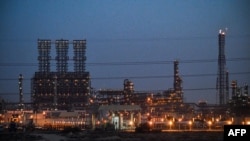Saudi Arabia had hoped hosting this week's summit of the Group of 20 industrialized nations would be an opportunity to showcase the kingdom's social and economic changes and tout its position as a Middle East powerhouse. But analysts say the region and its oil and gas reserves may lose prominence in U.S. foreign policy, as the future administration of U.S. President-elect Joe Biden focuses instead on renewable energy.
OPEC kingpin Saudi Arabia has enjoyed strong relations with the Trump administration, and some officials in the kingdom are wary of Biden, who earlier promised to make the oil giant a "pariah" over its human rights failings.
But Saudi Arabia's oil minister, Prince Abdulaziz bin Salman, says energy cooperation with the U.S. lays the basis for a "good relationship" for the common goal of maintaining oil market stability.
"We have a bilateral program. We have a joint aspiration of reducing emissions in the power sector," he told reporters this week. "If we can help each other bilaterally ... it will be a good launching pad for a good relationship with the yet-to-come Biden administration."
Oilprice.com points to price wars initiated by Saudi Crown Prince Mohammed bin Salman, which drew Washington's wrath earlier this year.
The online industry publication said Saudi moves "attempted to destroy, or at least disable, the U.S. shale oil industry in March, that even President Donald Trump felt compelled to personally call the Crown Prince and tell him that if he did not end the oil price war, then the U.S. would withdraw its military support for Saudi Arabia."
U.S. lawmakers said collapsing oil prices threatened to push American producers into bankruptcy.
Michele Dunne, director of Washington-based Carnegie Endowment for International Peace's Middle East Program, told a panel this week that Biden "knows a lot of these leaders" and does not want "to create a conflict with them," but U.S. policy decisions will take "a more traditional set of U.S. national security interests into account."
"President-elect Biden, like Trump and [Barack] Obama before him, is going to see that the Middle East is becoming less important to the United States as the sunset of the oil era approaches," Dunne said. "This is the real nervousness of the Middle East leaders."
Dunne also expressed concern the post-pandemic Middle East could witness more conflict.
"There are many legacy issues and relationships the U.S. can't walk away from," she said. "But the Biden administration is going to have a lot of difficult decisions about how to slowly begin to lower the investment in this region without destabilizing it, without creating too many opportunities for regional or global rivals to take advantage or without setting off a new arms race in the region by arming our allies as we try to withdraw."
Analysts say a U.S. review of arms sales to Saudi Arabia, following a massive arms deal with the United Arab Emirates, may follow even as neighboring Iran seems bent on building up its nuclear program.






